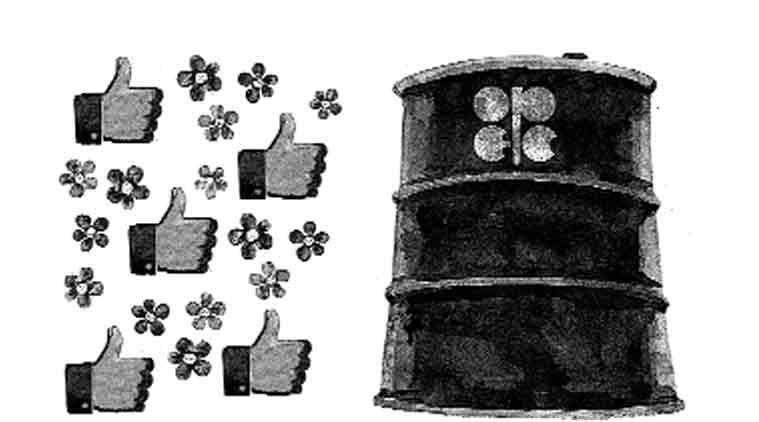Opinion Why Opec deserves a holiday card from India
In fact, as the year winds down, much of the rest of the world owes the cartel some gratitude as well

 Output from Iraq, already the second-largest producer in OPEC, averaged 3.5 million bpd.
Output from Iraq, already the second-largest producer in OPEC, averaged 3.5 million bpd.
What’s not to love about Opec? There has rarely been a better model of an international body banding together with a mission to stabilise a stubbornly unstable market. As steward of 75 per cent of the planet’s crude oil reserves, Opec can give the US Federal Reserve, the United Nations and Al Gore a run for their money in its power to simultaneously influence the world’s economy, its politics and its climate.
 For all its efforts, Opec has rarely had much affection directed its way from the rest of the planet in its 54 years of existence. Granted, few have gone to the extremes of Carlos the Jackal, who took it upon himself to kidnap several oil ministers of Opec member countries back in 1975. But the organisation forever remains a prisoner of that pariah of a label: cartel. Further, Opec’s price-fixing — a must for all cartels — unfortunately contributes disproportionately to inflation and economic downturns worldwide. Its stock in trade, fossil fuels, is blamed for making oceans rise, environmental degradation of cities and profoundly distorted weather patterns. Its member governments are generally not terribly popular in the international community, and mostly not even with their own citizenry. Opec’s is, indeed, a thankless task.
For all its efforts, Opec has rarely had much affection directed its way from the rest of the planet in its 54 years of existence. Granted, few have gone to the extremes of Carlos the Jackal, who took it upon himself to kidnap several oil ministers of Opec member countries back in 1975. But the organisation forever remains a prisoner of that pariah of a label: cartel. Further, Opec’s price-fixing — a must for all cartels — unfortunately contributes disproportionately to inflation and economic downturns worldwide. Its stock in trade, fossil fuels, is blamed for making oceans rise, environmental degradation of cities and profoundly distorted weather patterns. Its member governments are generally not terribly popular in the international community, and mostly not even with their own citizenry. Opec’s is, indeed, a thankless task. (Illustration: C Rsasikumar)
(Illustration: C Rsasikumar)
Despite all its challenges, thanks to the extraordinary leadership of the Saudi Arabians, Opec recently stood up to the upstart unconventional North American producers scouring shale and tar sands for “tight oil”. Opec’s solidarity in not cutting supplies has launched a price war — sheikhs vs shale, as The Economist puts it. Arcane price benchmarks, from West Texas Intermediate to Brent crude, plunged — exactly what the Saudis were hoping for, to slow US shale production by making it uneconomical. Economics professors used to love to use Opec as an example of a solution to one of the enduring problems of game theory — the prisoner’s dilemma. In its November meeting in Vienna, Opec produced a brand new game-theoretic lesson — keep prices lower than a “break-even price”, enough to deter those rascally entrants. Indeed, the strategy appears to be working in the near term. Already, new well permits for North American shale oil and gas fell 40 per cent in November. By all accounts, behind an agreement on this price cut was a painful process of arm-twisting by the Saudis.
Today, it is time for some of us to show a bit of love for Opec for giving us cheap oil. This is especially true for the average Indian, who must pay 110 per cent of her daily income to purchase a gallon of petrol, the second-highest among 61 countries, analysed by Bloomberg. Opec deserves some love at the very least from Messrs Narendra Modi and Arun Jaitley, hoping to pare back fuel subsidies and trimming one of Asia’s largest fiscal deficits.
Putting aside the grief of American shale upstarts, at least US President Barack Obama ought to show some love for Opec. Cheap oil should help American consumers and businesses feel richer; Obama badly needs some good news on the home front. Internationally, collapsing world oil prices will continue to put pressure on his nemesis, Vladimir Putin, who relies on oil and gas revenues for his swagger and cross-border adventures.
Indeed, all those leaders of liberal Western democracies who fret about autocratic governments ought to be showing some love for Opec. The discipline brought about by the Saudis has kept countries such as Iran and Venezuela in check. Without sufficient oil revenues, they have less wiggle room to cause trouble, and may even be forced to consider political reforms someday. The Chinese should love Opec, too. They must like their oil at prices below $70 a barrel, given their status as the world’s largest net importer of petroleum and liquid fuels.
As you can see, much of the rest of the world owes Opec some gratitude. It has been a tough year for Opec. It has had to grit its collective teeth and fix prices — and keep them low, rather than where member countries would like to fix them: as high as they possibly can. This could not have been easy.
Will the situation get any better next year? Will oil prices be higher or lower than at the end of this year? Making predictions about longer-term directions of oil prices is hazardous for three principal reasons.
One is that Opec has a rather miserable record at coordinating among its members, an essential element of the tradecraft of running a respectable cartel. Opec has repeatedly failed to respond on a timely basis in the past when prices fell — in the mid-1980s or in 2008. Members have recently had so much on their plates to make them somewhat distracted, and less-than-reliable, comrades in price-fixing over the long haul. Saudi Arabia and Iran are running a proxy war, pitting Sunni against Shia. Iraq is being devastated by the Isis. Libya has been a victim of protests and political instability, while Nigeria has to deal with oil theft, corruption and terrorism organised by an emboldened Boko Haram. No one seems to give a hoot about Venezuela, beset by a litany of problems, with no charismatic Hugo Chavez at the helm.
A second reason why it is hard to accurately forecast oil price movements year to year stems from the increasingly wide variations in weather patterns. The extremes of climate change make it harder for producers to ratchet production up or down to meet sudden unplanned spikes or troughs in the need for oil. Third, while Opec and the shale producers may be playing an elaborate chess game around the break-even price, it is clear that the shale industry was propelled by an abundance of spunk and innovative spirit. The drive to innovate and improve productivity is likely to continue and keep pressure on that break-even number, which will keep the rivals on both sides guessing.
Yes, at the end of a dramatic year for Opec, it is time for the world community to come together and recognise a unique institution. Opec’s solidarity might hold the key to unlocking higher growth rates across the global economy. Any agency with a mission to “ensure the stabilisation of oil markets in order to secure an efficient, economic and regular supply of petroleum to consumers, a steady income to producers and a fair return on capital for those investing in the petroleum industry” is the ultimate in all-round win-win. Such high-mindedness ought to be an inspiration to the rest of us.
In an undisciplined world, we must be thankful for the few exceptions that stand firm, despite the odds.
Show your love for Opec. Send a holiday card before year-end, expressing appreciation for all it has done for the world this year to their cheerless headquarters at Helferstorfer St 17, 1010 Vienna, Austria.
The writer is senior associate dean for international business and finance at The Fletcher School, Tufts University and founding executive director of Fletcher’s Institute for Business in the Global Context





